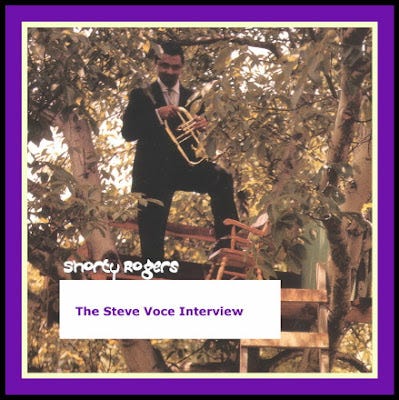Shorty Rogers As Interviewed By Steve Voce
© - Steven A. Cerra - copyright protected; all rights reserved.
"sprezzatura
Shorty Rogers's music exemplifies what the Italian courtier Castiglione called sprezzatura — the ability to do difficult things with apparent ease. For Castiglione, this attitude of studied nonchalance was the trademark of the Renaissance man. Half a millennium later, members of the beat generation described this same world view as being "cool"—and thought they had invented something new. The only difference was that the beats held up their "cool" demeanor as an attitude of rebellion against the system. Castiglione's ideal courtier was an organization man. He may have a bit of Bogart, a good measure of Chet Baker (circa 1952), and even a dash of James Dean, but his Renaissance cool never pushed things too far. Sprezzatura was beat without the bite.
Shorty Rogers is much the same. During the West Coast musical renaissance of the 1950s, Rogers offered his listeners sprezzatura in 4/4 time. His arrangements could swing without ostentation; his solos were executed with untroubled fluency; his compositions seemed to navigate the most difficult waters with a relaxed, comfortable flow that belied the often complex structures involved. Rogers's lifestyle, in its refusal to call attention to itself, followed a similar philosophy. While many of his colleagues on the West Coast found it easier to make headlines through their counterculture ways than through their music, Rogers had little to do with such excesses. He paid his dues and his monthly bills with equal equanimity. This was perhaps too cool. Rogers was easy to take for granted.
Rogers's visibility in jazz has been further hindered by his virtual retirement from performing situations since the early 1960s. Like his longtime colleague and collaborator Jimmy Giuffre, Rogers recorded prolifically between 1951 and 1963, only to fade from the scene afterwards. It is almost as it the amazing early fecundity had crammed a whole career of music-making into a dozen years. Nothing was left for an encore. Of course, neither Rogers nor Giuffre actually left the music world; they simply applied their skills elsewhere, in studio work or academic pursuits. But to the jazz community this was tantamount to retirement."
- Ted Gioia, West Coast Jazz: Modern Jazz in California, 1945-1960
The following interview by Steve Voce with trumpeter, composer-arranger Shorty Rogers who passed away in 1994 first appeared in the October 1982 edition of Jazz Journal.
Keep reading with a 7-day free trial
Subscribe to CerraJazz Substack to keep reading this post and get 7 days of free access to the full post archives.




